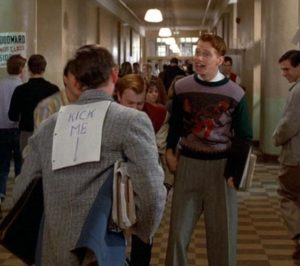I don’t know exactly how to write about this.
I previously wrote here about the purpose of a college education (“learn how to think”), and here about whether a professor calling a trans student “Mister” in the classroom is an exercise of academic freedom (no, it’s a personal insult).
Disputes over academic freedom and campus free speech are pretty common, especially in these politically fraught times. Most often those issues come up in the context of controversial issues (e.g., the Israeli-Palestinian conflict) or outside speakers invited on campus by student groups (e.g., College Republicans bringing in an agitator like Milo Yiannopoulos to stir the pot).
It’s a big subject, one I won’t fully address here; instead, I’ll zero in on a specific case.
A contretemps erupted this week at Berkeley over inviting a geophysicist to lecture on geophysics, after the gentleman was disinvited at M.I.T. over some remarks he published having nothing to do with geophysics, but everything to do with university administration. (For my satirical workup of that subject, go here.)
The problem? He co-authored a Newsweek op-ed (read it here) opposing “Diversity, Equity, and Inclusion” and supporting in its place something called “Merit, Fairness, and Equality (MFE),” under which, “university applicants are treated as individuals and evaluated through a rigorous and unbiased process based on their merit and qualifications alone.” (This would, as I understand it, apply to both student admissions and faculty hiring.)
He based his argument, in part, on a 2019 Pew poll purportedly showing that “74 percent of Americans think only qualifications should be taken into account in hiring and promotion, even if this results in less diversity, although he also argued there’s plenty of diversity on American campuses. Like a lot of things, this may look better on paper than it actually is (for one of my favorite examples, go here).
That approach would end affirmative action, but he argued it also would “mean an end to legacy and athletic admission advantages, which significantly favor white applicants, in addition to those based on group membership.” Obviously, there’s an academic constituency in favor of affirmative action, but more than stepping on their toes, probably what got him in trouble was a concluding paragraph that impliedly compared campus diversity programs to Nazi purges of German universities in the 1930s.
The upshot is calling affirmative action a Nazi program (at least, that’s how some people might have read it) made him persona non grata at M.I.T., among other places. I can’t tell you for sure whether controversy would have been avoided, had such an unfortunate choice of example been avoided, but I’m guessing it didn’t help.
When NBC News published this story here on Monday, October 19, 2021, their reporter bravely tried to write it up as a squabble among Berkeley professors over the limits of academic freedom. As their story presented it, some faculty didn’t want the co-author of that piece on their campus, while a department chair desired to look past the politics (and gaffe) and let him present his science lecture anyway.
But I don’t think this story is a good vehicle for discussing or debating academic freedom, because it’s not representative of the real issues around that subject (I’m choosing my words carefully here). It’s a one-off about a guy calling diversity and inclusion a Nazi program, so now they’re boycotting him. You just can’t get away from that.
 And that’s how I find myself writing about it. So what more is there to say? You can’t conduct an honest debate about diversity on those terms.
And that’s how I find myself writing about it. So what more is there to say? You can’t conduct an honest debate about diversity on those terms.
That leaves me in a lurch. I’ve gotta figure out a way to wrap up this posting.
So how about this? Send him back to high school to retake the subject he failed there, while he had his head buried too deep in math and physics books.